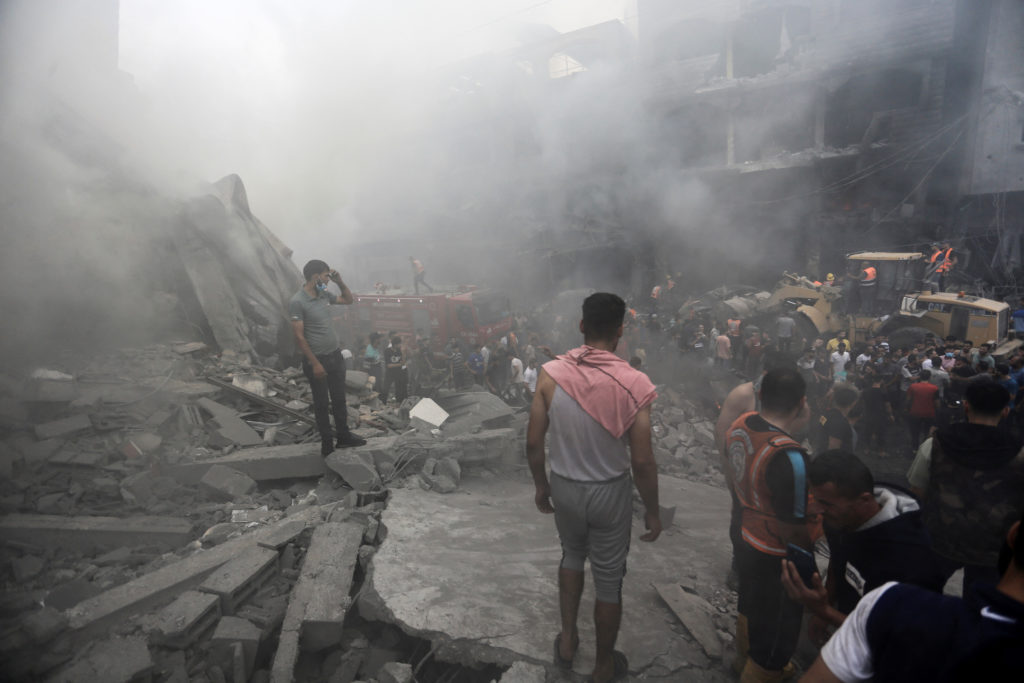CHICAGO (AP) — Illinois leaders went to court Monday to stop President Donald Trump from sending National Guard troops to Chicago, escalating a clash between Democratic-led states and the Republican administration during an aggressive immigration enforcement operation in the nation’s third-largest city.
The legal challenge came hours after a judge blocked the Guard’s deployment in Portland, Oregon. The Trump administration has portrayed the cities as war-ravaged and lawless amid the government's crackdown on illegal immigration. Officials in Illinois and Oregon say military intervention isn’t needed and that federal involvement is inflaming the situation.
The lawsuit alleges that 'these advances in President Trump’s long-declared ‘War’ on Chicago and Illinois are unlawful and dangerous.' Illinois Gov. JB Pritzker, a Democrat, stated around 300 Guard troops from Illinois were to be federalized and deployed, along with 400 others from Texas.
Pritzker criticized the move as 'Trump’s invasion,' urging Texas Governor Greg Abbott to intervene and halt the deployment. Abbott maintained the crackdown is required to protect federal workers in the city due to the president’s increased enforcement measures.
Amidst this controversy, White House spokesperson Abigail Jackson confirmed Trump authorized the use of Illinois National Guard members, pointing to ‘ongoing violent riots and lawlessness.’ Chicago Mayor Brandon Johnson counters this approach, issuing an executive order barring federal immigration agents from utilizing city-owned property as staging grounds for enforcement actions.
In the city, residents have expressed alarm at the sight of armed Border Patrol agents conducting arrests near prominent landmarks, furthering concerns following the initiation of new immigration crackdowns that disproportionately target immigrant-heavy neighborhoods.
The Department of Homeland Security reported an incident over the weekend when agents shot a woman after being surrounded by vehicles in a patrol zone. With such tensions rising, the conflict over the National Guard's involvement in these operations underscores a broader controversy around immigration policy and local governance in Chicago and across the nation.
The legal challenge came hours after a judge blocked the Guard’s deployment in Portland, Oregon. The Trump administration has portrayed the cities as war-ravaged and lawless amid the government's crackdown on illegal immigration. Officials in Illinois and Oregon say military intervention isn’t needed and that federal involvement is inflaming the situation.
The lawsuit alleges that 'these advances in President Trump’s long-declared ‘War’ on Chicago and Illinois are unlawful and dangerous.' Illinois Gov. JB Pritzker, a Democrat, stated around 300 Guard troops from Illinois were to be federalized and deployed, along with 400 others from Texas.
Pritzker criticized the move as 'Trump’s invasion,' urging Texas Governor Greg Abbott to intervene and halt the deployment. Abbott maintained the crackdown is required to protect federal workers in the city due to the president’s increased enforcement measures.
Amidst this controversy, White House spokesperson Abigail Jackson confirmed Trump authorized the use of Illinois National Guard members, pointing to ‘ongoing violent riots and lawlessness.’ Chicago Mayor Brandon Johnson counters this approach, issuing an executive order barring federal immigration agents from utilizing city-owned property as staging grounds for enforcement actions.
In the city, residents have expressed alarm at the sight of armed Border Patrol agents conducting arrests near prominent landmarks, furthering concerns following the initiation of new immigration crackdowns that disproportionately target immigrant-heavy neighborhoods.
The Department of Homeland Security reported an incident over the weekend when agents shot a woman after being surrounded by vehicles in a patrol zone. With such tensions rising, the conflict over the National Guard's involvement in these operations underscores a broader controversy around immigration policy and local governance in Chicago and across the nation.






















